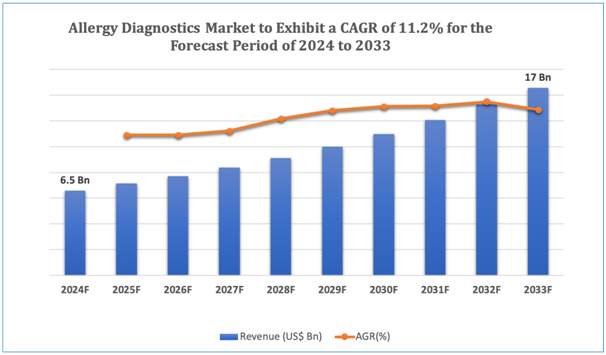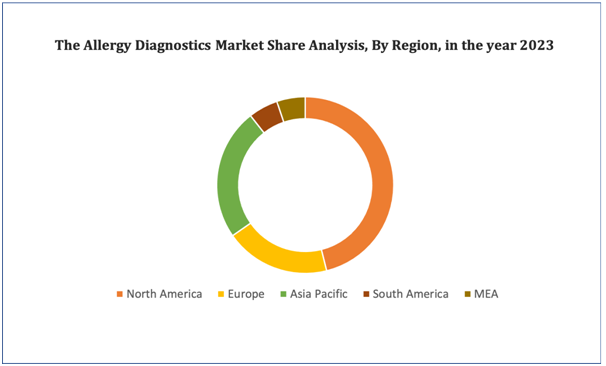Allergy DiagnosticsMarket Overview
The global allergy diagnostics market is estimated to be worth over USD 17 Bn in 2033 and is expected to grow at CAGR of 11.2% during the forecast period (2024-2033).
Allergy diagnostics is transforming healthcare by allowingquicker and more precise identification of allergens, which substantiallyenhances patient outcomes and quality of life. Allergies affect millions across the world, with symptoms scaling from mild discomfort to life-threatening conditions such as anaphylaxis. The surge in environmental pollution, varying dietary habits, and growing exposure to allergens has fuelled the demand for accurate diagnostic tools. Allergy diagnostics involves a range of tests, comprising skin prick tests, blood tests (such as specific IgE testing), and challenge tests, all focused at determining specific allergic reactions to substances like food, pollen, dust mites, or animal dander.
One of the major developments in this field is the incorporation of advanced technologies, such as molecular diagnostics and component-resolved diagnostics (CRD). These technologies enable for more detailed insights into the specific components of allergens, rather than just the allergen itself, helping clinicians tailor treatment plans more effectively. This personalized approach in allergy management is revolutionizing patient care by offering targeted therapies that minimize unnecessary medication use and focus on precise triggers.
The rise of at-home testing kits is also making allergy diagnostics more accessible, offering convenience for patients who can now perform certain tests in the comfort of their homes. These kits, combined with telemedicine platforms, are making allergy management more patient-centric, enabling real-time monitoring and adjustment of treatments based on accurate diagnostics.
Alongside, the increasing awareness of the prominence of early and precise diagnosis in managing allergies has led to higher adoption of allergy diagnostics globally. As more people seek to address their allergic conditions proactively, healthcare providers are investing in these diagnostic technologies to offer improved care. This shift is also leading to better understanding and management of allergic conditions in children, whose early diagnosis can avoid lifelong complications.
Overall, allergy diagnostics is playing a crucial role in the transformation of healthcare, moving it toward proactive, personalized, and patient-centered care, which is critical in addressing the soaring burden of allergic diseases worldwide.
Figure 1. Allergy Diagnostics: Market Size

Get more details on this report - Request Free Sample
Key Market Insights
The global allergy diagnostics market is witnessingrobust growth, fuelled by the growing prevalence of allergies globally. Increasing environmental pollution, changes in lifestyle, and soaring awareness about allergic conditions are major factors accelerating market demand. The market is seeing significant developments, especially in the adoption of molecular diagnostics and component-resolved diagnostics (CRD), which offer higher precision in determining specific allergen components. These advanced technologies allow for more personalized treatment approaches, significantly enhancing patient outcomes.
Novel innovations, such as automated diagnostic systems and point-of-care testing kits, are making allergy diagnostics more efficientand accessible. At-home allergy testing kits, integrated with telemedicine platforms, are expanding the reach of diagnostics, enabling patients to monitor and manage their allergies remotely. These technologies not only improve patient convenience but also encourage early detection, thusmitigating the risk of severe allergic reactions.
The market is also experiencing collaborations between leading players and research institutions aimed at developing next-generation diagnostic tools. These partnerships are focused on enhancing the accuracy, speed, and affordability of allergy testing. Furthermore, increasing investment in biotechnology and advancements in immunoassay-based tests are expected to drive the market forward.
Overall, the allergy diagnostics market is evolving swiftly, with an emphasis on personalized, patient-centric solutions. As awareness and technological advancements continue to increase, the market is poised for robust growth, particularly in developed regions where healthcare infrastructure facilitates the adoption of these innovative diagnostic tools.
Market Dynamics
Market Drivers
Increased Prevalence And Heavy Economic Burden Of Allergic Diseases
The increased prevalence of allergic diseases and their associated heavy economic burden is a major market driver for the global allergy diagnostics market. Allergic conditions, including rhinitis, asthma, eczema, and food allergies, are on the soarworldwideowing to factors like pollution, urbanization, and variations in diet and lifestyle. This soaring prevalence has placed a notableburden on healthcare systems worldwide, increasing the demand for effective diagnostic solutions. According to the World Allergy Organization, around 30-40% of the global population is affected by one or more allergic conditions, with the numbers steadily growing each year.
The economic strain of allergic diseases is significant, as they lead to recurrent healthcare visits, increased medication use, hospitalizations, and loss of productivity. For instance, allergic rhinitis and asthma substantially reduce an individual’s quality of life and can result in missed workdays and school absenteeism. As a result, healthcare providers are emphasizing on early detection and management of allergic diseases to reduce these costs.
This increasing focus on allergy management has spurred demand for advanced diagnostic technologies that can identify allergens accurately and efficiently. This allows healthcare professionals to offer more targeted therapies, reduce emergency cases, and improve long-term patient outcomes. Therefore, the increasing prevalence and economic toll of allergic diseases are accelerating the demand for better, more accessible allergy diagnostics on a global scale.
Market Restraints
With regard to numerous advantages of allergy diagnostics, the market faces several challenges due to the unique characteristics and requirements associated with these potent pharmaceutical products. Some of the key market challenges include:
- High Costs of Diagnostic Procedures: The advanced technologies used in allergy diagnostics, such as molecular testing and specific IgE testing, can be expensive, limiting their adoption in developing regions and among lower-income populations. This cost barrier restricts market growth, especially in countries with limited healthcare reimbursement structures.
- Lack of Awareness and Misdiagnosis: Many people with allergic conditions may remain undiagnosed or misdiagnosed due to a lack of awareness about allergy diagnostics and limited access to specialized healthcare services. This can result in ineffective treatment, reducing the demand for diagnostic solutions.

Get more details on this report - Request Free Sample
Market Opportunity
Growing Usage Of mHealth In Allergy Diagnosis
mHealth platforms enable patients to monitor and manage their allergic conditions using mobile applications and wearable devices. These technologies offer real-time data on symptoms, triggers, and medication adherence, empowering patients with better control over their allergies. In addition, mHealth tools can support remote consultations with healthcare professionals, ensuring timely intervention and more personalized care.
The adoption of mHealth is especially beneficial in regions with limited access to healthcare facilities, offering a more cost-effective and convenient approach to allergy diagnosis. Patients can easily track their condition, determine patterns, and receive digital consultations, reducing the need for frequent hospital visits. Along with that, the integration of artificial intelligence (AI) in these platforms can enhance diagnostic accuracy by analysing patient data, which leads to better management and prevention of severe allergic reactions.
With the surge of wearable health technology, the allergy diagnostics market has the potential to expand by offering innovative solutions that align with modern healthcare trends. As more people turn to digital health solutions, the use of mHealth in allergy diagnosis is likely to increase, creating a new avenue for growth and product development in the global allergy diagnostics market.
Market Trends
- Integration of Artificial Intelligence (AI) and Machine Learning in Diagnostics: AI and machine learning are increasingly being integrated into allergy diagnostics, enhancing the accuracy and speed of identifying allergens. These technologies help in analysing large sets of patient data, leading to more precise diagnosis and personalized treatment plans.
- Rising Adoption of At-Home Diagnostic Kits: There is a growing trend towards the use of at-home allergy diagnostic kits, driven by consumer demand for convenience and accessibility. These kits allow patients to test for common allergens in a home setting, reducing the need for in-person visits to healthcare facilities while still providing accurate results.
Allergy Diagnostics Market: Key Segments
By Product and Service
- Assay Kits
- Instruments
- Services
- Consumables
By Tests
- In-vivo Tests
- In-vitro Tests
By Allergen
- Inhaled Allergens
- Food Allergens
- Drug Allergens
- Other Allergens
By End User
- Diagnostic Laboratories
- Hospital-Based Laboratories
- Academic Research Institutes
- Other End Users
By Key Geographical Regions
- North America
- Europe
- Asia-Pacific
- Middle East and Africa
- South America
Figure 4. Allergy Diagnostics Market: Distribution by Region

Get more details on this report - Request Free Sample
Allergy Diagnostics Market: Regional Analysis
North America dominates the allergy diagnostics market due to the increase in the incidence of respiratory allergic disorders. In addition, the soaring awareness levels related to the allergy diagnostics and the adoption of in vitro blood tests will further accelerate the growth of the allergy diagnostics market in the region during the forecast period.
Asia-Pacific is projected to observe a major amount of growth in the allergy diagnostics market due to the rapid change in the improving of healthcare infrastructure. Additionally, the untapped clinical needs and the growing need for minimally invasive diagnostic tools is further anticipated to boost the growth of the allergy diagnostics market in the region in the coming years.
Leading Allergy Diagnostics Developers
Industry Trends and Global Forecasts, 2023-2035 report features an extensive study of the current market landscape, market size and future opportunities associated with the Allergy Diagnosticsmarket, during the given forecast period. Further, the market report highlights the efforts of several stakeholders engaged in this rapidly emerging segment of the biopharmaceutical industry. Key takeaways of the Allergy Diagnosticsmarket are briefly discussed below.
The report includes the list of players operating in the global Allergy Diagnosticsmarket. Some of the key players include:
- Astra Biotech GmbH
- bioMerieux SA
- Danaher
- DST Diagnostische Systeme & Technologien GmbH
- Dr. Fooke Laboratorien GmbH
- EUROIMMUN Medizinische Labordiagnostika AG
- GA Generic Assays GmbH
- HOB Biotech Group Corp., Ltd.
- HYCOR Biomedical
- INDOOR Biotechnologies, Inc.
- Lincoln Diagnostics, Inc.
- Minaris Medical America, Inc.
- Omega Diagnostics Group PLC
- R-Biopharm AG
- ROXALL Medizin GmbH
- Siemens
- Stallergenes Greer
- Thermo Fisher Scientific
- Tecan Trading AG
Allergy Diagnostics Market: Key Developments
- In September 2024, San Francisco start-up SoundHealth has launched an artificial intelligence (AI) powered app to enable allergy sufferers to get ahead of an attack.Dubbed SONUcast, the application predicts a user’s susceptibility to allergies based on the dimensions of a person’s nasal cavity and sinuses. It also uses patented AI algorithms to scan a user’s face and produce a real-time, personalised forecast of their allergy symptoms based on their location by using real-time meteorological data to warn a user of the likelihood of an impending allergic reaction to air-based particulates such as pollen.
- In August 2023, Gold Standard Diagnosticslaunched the DNAllergen real-time PCR kits, a new product line which completes our allergen testing offer with molecular method. This technique enables the detection of some specific allergens which are not easy to identify by immunoassays (e.g celery), and show no cross-reactivity with related species (e.g. mustard and rapeseed).
Scope of the Report
The market report presents an in-depth analysis of the various firms / organizations that are engaged in this market, across different segments, as defined in the below table:
|
|
Key Report Attributes |
Details |
||
|
|
Base Year |
2023 |
||
|
|
Forecast Period |
2024-2033 |
||
|
|
CAGR (2024-2033) |
11.2% |
||
|
|
Products & Services |
|
||
|
|
Tests |
|
||
|
|
Allergen |
|
||
|
|
End User |
|
||
|
|
Key Geographical Regions |
|
||
|
Key Companies Profiled |
|
|
||
